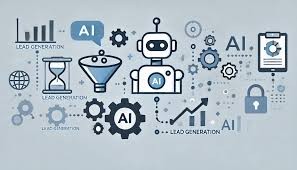Artificial Intelligence (AI) is reshaping various industries, and one area where its impact is particularly profound is lead generation. The traditional methods of identifying and nurturing potential customers are rapidly being replaced by AI-driven approaches. AI lead generation not only automates the process but also provides a higher level of precision, personalization, and efficiency. This shift is helping businesses connect with the right customers, streamline sales pipelines, and maximize return on investment (ROI).
In this article, we will explore how AI is transforming lead generation, the benefits it offers to businesses, and the specific techniques and technologies being utilized. We will also discuss challenges, ethical considerations, and future trends in AI-driven lead generation, ensuring you have a comprehensive understanding of this critical business tool.

The Evolution of Lead Generation
Lead generation has always been a key element in marketing strategies. Historically, businesses relied on methods such as cold calling, mass emails, direct mail, and attending trade shows to gather leads. These methods, though somewhat effective, were labor-intensive and often resulted in a high percentage of uninterested prospects. With the advent of digital marketing, online forms, email campaigns, and content marketing became popular, but these strategies still involved a level of human effort and manual intervention.
Enter AI. The incorporation of artificial intelligence into marketing has taken lead generation to new heights. AI-driven tools can now automatically identify potential leads by analyzing data, behavioral patterns, and online activities. Machine learning algorithms help refine target audiences, while predictive analytics enables businesses to forecast which leads are most likely to convert into customers. This level of sophistication has made AI an indispensable tool in modern lead-generation practices.
How AI Works in Lead Generation
AI lead generation relies on a variety of technologies, each contributing to different aspects of the process. Here are some of the key components:
Machine Learning (ML): Machine learning algorithms analyze vast amounts of data to identify patterns and trends. In lead generation, ML helps identify potential leads based on specific behaviors and demographic data. For example, a user who visits a company's website multiple times engages with content, and subscribes to newsletters is more likely to be a qualified lead. Machine learning helps marketers focus on leads with a higher chance of conversion, reducing time spent on cold leads.
Predictive Analytics: Predictive analytics uses historical data to predict future outcomes. In lead generation, it can forecast which leads are likely to become customers. By analyzing data from past campaigns, AI models can predict customer behavior and determine the likelihood of a prospect becoming a paying customer. This allows businesses to prioritize leads based on their potential value.
Natural Language Processing (NLP): NLP enables AI systems to understand and interpret human language. In the context of lead generation, NLP can analyze written or spoken communication, such as email inquiries, social media interactions, or chat conversations, to gauge a prospect’s interest level and intent. Chatbots, for instance, leverage NLP to provide real-time, personalized interactions with potential customers, and qualifying leads before passing them on to sales teams.
Automated Data Analysis: AI is capable of analyzing vast amounts of data quickly and efficiently. It can gather information from various sources—websites, social media platforms, CRM systems, and customer interactions—to identify new leads. AI-driven tools can scrape the web for relevant contacts, monitor social media for mentions of a company’s products or services, and evaluate competitors’ customer bases to find leads that align with a business’s target market.
Behavioral Analytics: AI can track how users interact with websites, emails, and social media. It analyzes patterns of behavior, such as pages viewed, time spent on specific content, and click-through rates, to determine which prospects are more engaged. This allows companies to prioritize leads who are more likely to convert based on their interactions with digital content.
The Benefits of AI Lead Generation
AI-powered lead generation offers numerous advantages that traditional methods simply cannot match. Some of the most significant benefits include:
Precision and Accuracy: AI can sift through massive datasets to identify leads with a higher level of accuracy than human efforts. By using predictive models and analyzing patterns, AI can help businesses target prospects that are most likely to convert, minimizing wasted effort on cold leads.
Efficiency and Automation: One of the most significant advantages of AI is the automation of time-consuming tasks. From analyzing data to sending personalized follow-up emails, AI can automate repetitive processes, freeing up human resources for more complex and strategic tasks. This results in greater operational efficiency and faster lead-generation processes.
Personalization: Modern consumers expect personalized experiences, and AI helps deliver just that. By analyzing individual behaviors and preferences, AI can tailor content, emails, and interactions to each lead, increasing the chances of conversion. This level of personalization is difficult, if not impossible, to achieve manually at scale.
Scalability: AI can handle massive amounts of data and leads simultaneously, making it highly scalable. Whether a company needs to manage hundreds or thousands of leads, AI can analyze, qualify, and nurture them without the need for additional human resources.
24/7 Availability: AI-powered tools, such as chatbots, can interact with potential customers at any time of day. This round-the-clock availability ensures that leads are engaged promptly, even outside of business hours, which can prevent potential opportunities from slipping away.
Real-World Applications of AI Lead Generation
The use of AI for lead generation is already widespread across a variety of industries, each benefiting in different ways:
E-commerce: AI is revolutionizing lead generation in e-commerce by analyzing customer browsing behavior and purchase history. AI-driven recommendation engines suggest products that a customer might be interested in, increasing the likelihood of conversion. Additionally, AI tools can retarget customers who have abandoned shopping carts or visited specific product pages, nurturing these leads through personalized email campaigns.
B2B Marketing: In the B2B sector, AI helps identify high-quality leads by analyzing company data, firmographic information, and online behavior. AI tools can qualify leads based on factors such as company size, revenue, and decision-making authority, helping sales teams focus their efforts on the most promising prospects.
Real Estate: AI is transforming the real estate industry by identifying potential buyers or renters based on browsing behavior, geographic preferences, and social media activity. Real estate agencies can use AI to target specific demographics, ensuring that their marketing efforts are reaching the right audience.
Healthcare: In healthcare, AI assists in lead generation by identifying patients who may be interested in specific treatments or services. By analyzing data such as search queries, appointment history, and health conditions, AI can help healthcare providers reach patients who are most likely to benefit from their offerings.
Financial Services: AI-driven lead generation is highly effective in the financial industry. Banks and financial institutions use AI to analyze customer financial data and predict which services, such as loans or investment products, are most relevant to potential leads. This targeted approach increases the likelihood of conversion and improves customer satisfaction.
The Challenges and Limitations of AI Lead Generation
While AI offers significant advantages for lead generation, there are also some challenges and limitations that businesses need to consider:
Data Quality: AI relies on vast amounts of data to function effectively. Poor-quality data, such as outdated or inaccurate information, can lead to incorrect predictions and result in missed opportunities. Ensuring that data is clean, up-to-date, and relevant is critical for successful AI lead generation.
Privacy Concerns: AI's ability to analyze and track user behavior raises privacy concerns. Businesses must ensure that they are complying with data protection regulations, such as GDPR, and that they are transparent with customers about how their data is being used. Failure to do so can damage a company's reputation and result in legal consequences.
Cost and Implementation: While AI tools can offer long-term savings through automation and efficiency, the initial cost of implementation can be significant. Additionally, businesses need to ensure they have the necessary infrastructure and expertise to manage AI-driven lead generation tools effectively.
Dependence on Algorithms: AI models are only as good as the algorithms that power them. If the algorithms are flawed or biased, they can produce inaccurate results. Continuous monitoring and refinement of AI models are necessary to ensure they are functioning optimally.
Over-Reliance on Automation: While AI can automate many aspects of lead generation, human oversight is still necessary. Over-reliance on AI without human intervention can lead to missed opportunities, as AI may not fully capture the nuances of certain interactions or customer behaviors.
Future Trends in AI Lead Generation
The future of AI lead generation is promising, with several emerging trends set to shape the industry:
AI-Driven Content Creation: AI tools are increasingly adept at creating personalized content, such as email campaigns and social media posts, based on customer behavior and preferences. This trend will likely continue, with AI playing a larger role in crafting content that resonates with specific audiences.
Voice-Activated Lead Generation: As voice search becomes more popular, AI tools are being developed to capture leads through voice-activated devices. This opens up new opportunities for businesses to engage with customers more conversationally and interactively.
Hyper-Personalization: AI's ability to analyze vast amounts of data will enable even more granular levels of personalization. In the future, businesses can tailor their marketing efforts to individual preferences with greater precision, leading to higher conversion rates.
AI and Predictive Lead Scoring: Predictive lead scoring will continue to evolve, with AI models becoming more accurate and sophisticated. Businesses will be able to rely on AI to identify leads that have the highest potential for conversion, further optimizing the sales process.
About AI Lead Generation
Q: How does AI improve lead generation?
AI improves lead generation by automating tasks such as lead scoring, data analysis, and personalized engagement. It allows businesses to focus on high-potential leads, optimize campaigns in real-time, and increase overall efficiency.
Q: Is AI lead generation suitable for small businesses?
Yes, AI lead generation can be beneficial for businesses of all sizes. Many AI tools are scalable, making them accessible to small businesses looking to improve their lead generation efforts without requiring significant resources.
Q: Can AI lead generation replace human sales teams?
No, AI lead generation is not meant to replace human sales teams but to complement them. AI handles repetitive tasks and data analysis, allowing sales teams to focus on building relationships with qualified leads and closing deals.
Q: What data is needed for AI lead generation?
AI lead generation relies on data such as website traffic, customer behavior, demographics, social media activity, and past interactions with the business. The more data available, the more accurate and effective the AI system will be.
Q: How does AI lead scoring work?
AI lead scoring involves assigning values to leads based on factors such as engagement, behavior, and demographics. The AI system analyzes these factors to predict which leads are most likely to convert, allowing sales teams to prioritize high-potential prospects.
Q: What are the ethical concerns related to AI lead generation?
Ethical concerns surrounding AI lead generation include data privacy, bias in AI algorithms, and the potential for AI to make unfair or discriminatory decisions. Businesses must ensure they use AI responsibly and follow ethical guidelines when implementing AI systems.
Q: What is the future of AI in lead generation?
The future of AI in lead generation will likely include more advanced predictive models, hyper-personalization, voice search integration, and AI-driven content creation. These advancements will continue to improve the efficiency and effectiveness of lead generation efforts.
In conclusion, AI lead generation is revolutionizing the way businesses attract and convert prospects. By automating key tasks, improving lead scoring, and enhancing personalization, AI helps businesses focus their efforts on the leads that matter most, leading to higher conversion rates and improved sales performance.
As AI technology continues to evolve, businesses that embrace AI-driven lead generation strategies will be well-positioned to stay ahead of the competition. While challenges exist, the potential benefits of AI in lead generation far outweigh the obstacles, making it an essential tool for businesses looking to scale their growth in the modern era.
Whether you're a small startup or a large enterprise, AI lead generation can provide the insights and automation needed to streamline your lead generation process and drive business success.



